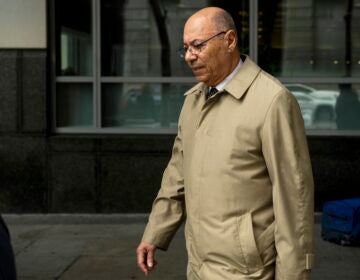DA Krasner fought against civil asset forfeiture. But under his watch, the practice continues
The use of civil asset forfeiture increased slightly in Philadelphia last year, despite the election of District Attorney Larry Krasner, a critic of the practice.
Listen 1:26
In this file photo, Philadelphia District Attorney Larry Krasner speaks with members of the media during a news conference in Philadelphia, Tuesday, Sept. 4, 2018. (Matt Rourke/AP Photo)
The use of civil asset forfeiture increased slightly in Philadelphia last year, despite the election of District Attorney Larry Krasner, a critic of the practice who swept into office with a promise to scale back its application.
Civil asset forfeiture is a legal mechanism that allows law enforcement to generate revenue from the property they seize from criminal suspects, even if a conviction is never secured. Krasner, a former defense attorney and criminal justice reformer, once called forfeiture “an abusive process.”
“I think we should not be in the business of taking cash off poor people unless there’s absolute proof and guilt and a conviction,” Krasner said, in 2017.
He walked back this pledge once in office, saying he would instead require a conviction in “99%” of cases. But a new forfeiture report from the Pennsylvania Office of the Attorney General shows that the Philadelphia District Attorney did not hold to that maxim during his first six months in office.
AG records indicate that approximately 1,300 forfeiture petitions were processed from January to July 2018, a small increase over the six months prior to Krasner’s inauguration.
Only about 700 of these cases — 54% — appeared to be linked to cases that resulted in a criminal conviction. The median value of these seizures was about $200.
In total, the Philly DA moved to seize about $1.3 million between July 2017 and July 2018, about $846,000 of which appears to have occurred under Krasner’s watch, according to the report.
The prior fiscal year, well before Krasner was sworn in, the Office of the District (DAO) took slightly less –– about $1.2 million.
The number of homes and vehicles seized by the DAO also increased over the same period, when compared to the prior year. Seizures of cars and trucks nearly quadrupled, from 28 to 104. The DAO said that most of the cars were taken before Krasner took office.
Krasner’s office confirmed that the courts had granted roughly 1,300 forfeitures since the DA was sworn in. Jane Roh, Krasner’s communication’s director, said that, despite the uptick in takings, the figure represents reform.
“The policy of the District Attorney’s Office under Larry Krasner is to take a much more careful and individualized approach toward seeking forfeiture of seized assets, including by making conviction a requirement in the overwhelming majority of cases,” Roh said. “Instances of deviation from policy can in many cases be attributed to the transitional nature of new policy implementation, particularly in 2018, as well as the impact of litigation against the DAO over practices that preceded District Attorney Krasner.
The 2018 settlement of a class-action lawsuit over past abuses of forfeiture in Philadelphia had further chilled this practice, Roh said.
Roh cautioned against making judgments about the values of seized assets and the status of the related criminal cases because of the limited information in the state report.
“I’d also be cautious about using language like ‘brought in’ because again, a significant amount of assets are eventually returned or are forfeited simply as a result of the defendants’ lack of participation in the process,” Roh said in an email.
But critics of forfeiture said the report’s general findings reflect a pattern of taking they didn’t expect from a DA who had positioned himself as an opponent of these seizures.
“I’m not sure what the justification is for pursuing something that he himself has said was an abusive process,” said Molly Tack-Hooper, senior staff attorney for the ACLU of Pennsylvania, which has criticized the use of forfeiture across the state. “If people are losing stuff through civil forfeiture when their case has been withdrawn or dismissed, he’s not living up to his own vision of how this should work.”
Tack-Hooper specifically criticized Krasner for the repeated seizure of small amounts of cash –– a practice the DA repudiated during his days as a defense attorney. Because forfeited property is sought through a civil process, defendants are not entitled to a criminal defense attorney. Many indigent defendants simply opt not to contest law enforcement taking small amounts of cash, because it is too costly to retain a lawyer.
Although virtually all the seizures reflected in the most recent AG report stem from years-old arrests, Tack-Hooper said it was still well within Krasner’s power to put halt the forfeiture process at will.
“You can withdraw the forfeiture petitions,” she said. “He can end the forfeiture proceeding and start exercising some meaningful prioritization of forfeiture petitions to focus on significant sums of cash.”
Krasner’s office said other changes made by his administration reflect the former prosector’s commitment to a more progressive criminal justice system.
“As District Attorney Krasner has said numerous times, the use of the forfeiture program will not be used, and is not being used, for any recurring law enforcement expenditures,” said Cameron Kline, senior communications advisor for the DA, pointing to a recent shortage in overtime funds at the city’s forensics lab as an example.
This change, in theory, removes an incentive for police to seize more property in hopes the department would benefit from these proceeds.
But Roh said the office has no ambitions to stop the practice completely and “DA Krasner has never said otherwise.”
“It would be counterproductive and irresponsible for the DAO to stop the practice of forfeiting assets including cash or other property that are the proceeds and instruments of criminal activity,” Roh said. “Civil asset forfeiture is a misleading term in itself since most of the assets seized are related to criminal matters.”
Asset forfeiture tends to draw criticism from across the political spectrum. Progressives say the practice unduly impacts poor defendants and minorities. Across the aisle, many conservatives view the process as government infringement on property rights.
Nearly all critics of forfeiture say that the legal mechanism creates a perverse, money-making incentive for law enforcement and risks taking property from innocent people. Several states, like Nebraska, New Mexico and North Carolina, have eliminated the practice altogether.
Just last year, Philadelphia agreed to settle a lawsuit over some past abuses –– in which homes and other property were wrongly taken from innocent individuals –– for $3 million. In April of this year, Krasner joined other elected officials, condemning the past excesses of the city’s longtime approach to forfeiture.
“All that it did was incentivize prosecutors to always try to take grandma’s house, always try to take a working person’s car,” he said, earlier this year, referring to asset forfeiture.
Philadelphia’s forfeiture program is still far less lucrative than in its heyday, when seizures brought in upwards of $6 million annually, including thousands of cars and homes, and served as a slush fund for the DA and city police.
A PlanPhilly analysis of real estate seized through forfeiture between 1993 and 2018 found that most of the properties taken came from black and Latino neighborhoods with high rates of poverty. Other large swaths of Philadelphia, such as Center City, never saw a single property forfeited. Ever.
City Councilwoman Maria Quiñones-Sánchez represents much of the Kensington neighborhood in a council district that saw more properties forfeited than any other. In 2018, she said that the seizures did not help the area.
“We tried to confiscate and arrest our way out of the drug problem,” she said. “Forfeiture is a perfect example of what the city’s strategy was. It was a lot of people reacting to the drug issue, but no one is thinking about how to actually stabilize the properties.”
The number of houses taken in the last year is a small fraction of the takings of the past. In general, revenue generated by forfeiture has declined in the city during five of the past seven reporting periods, as has spending.
But for reform-minded lawyers like Tack-Hooper, the change has not yet gone far enough.
“I think Larry Krasner has said it really well himself,” Tack-Hooper said, of the DA’s past criticism of asset forfeiture. “This is obviously something he understands is fundamental to fairness and thinks should happen.”
Editors Note: This article was updated on Sept. 11 at 5:07 pm to reflect new information from the DAO regarding the timing of cars and truck forfeitures.
WHYY is your source for fact-based, in-depth journalism and information. As a nonprofit organization, we rely on financial support from readers like you. Please give today.







